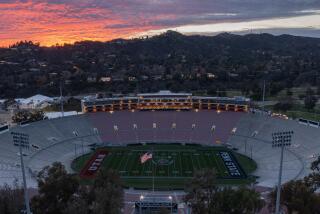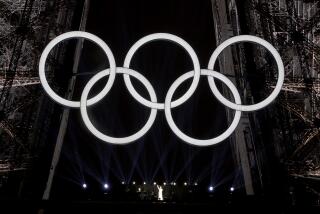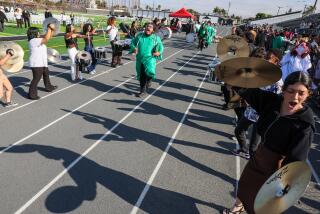It Takes Months to Learn to Play ’76 Trombones’ as One
The autumn ritual began with a cacophony of trilling flutes, clacking snare drums and crooning clarinets.
Fledgling musicians with a heady dose of ambition and a nearby ZIP Code swarmed the southwest corner of Pasadena City College. Searching for classrooms and gripping instruments, the teens from more than 100 high schools lingered.
Moments later, they headed toward their auditions and to find out what it takes to be in the Tournament of Roses Honor Band.
On this mid-October day, marching band leader Jim Arnwine directed the mostly gangly teens to their places. The percussionists gathered on the sports field. The woodwinds and brass in the music building and the color guard in the gym.
Outwardly, none appeared to be concerned with time, but it would become their biggest challenge. For the moment, the biggest concern was making the band.
It’s a far cry from the experience of most out-of-state bands, to which an invitation to march in Pasadena may come once in a lifetime. Even if chosen, the lucky few sometimes find themselves holding bake sales and car washes to help pay for the costly airfare and accommodations.
Unlike most of the other Rose Parade marching musicians, members of this hometown band are plucked from among some of the best budding talent in Southern California. By day’s end, 597 hopefuls will be whittled down to 201.
But the hometown advantage does have its disadvantages.
In a dozen practices, Arnwine must shape a band for the 115th Annual Rose Parade on New Year’s Day. The newly minted members, along with the college’s own group of 52, must be able to strut down Colorado Boulevard in front of 800,000 spectators and an estimated 200 million television viewers worldwide.
“Students love audiences, and there’s no bigger audience than the Rose Parade,” said Arnwine, 48, who is also the college’s director of music.
To wear the band’s uniform, a wannabe must be musically fluent and able to master the march. Keeping a crisp sound while your instrument’s mouthpiece is bouncing is a challenging chore, Arnwine said knowingly. All must be a synchronized flash of red and white -- the colors of the 75-year-old band.
There’s little Arnwine hasn’t seen in the last 18 years: Heat exhaustion, blisters and quitters, just to name a few. One year, Pasadena police caught two trombonists drunk hours into the new year. Then there was the saxophonist who fell just before the parade and knocked out some teeth.
“We’ll always find a way to perform,” said the assistant band director, Alyson McLamore. “Jim has missed rehearsals and been home sick before. Sometimes we’re limping for a day or two. The show goes on.”
Audition day experiences differed for the band-member hopefuls. Some performed with the jitters, while others fingered their instruments with self assurance.
Keith Hetrick needed only two days of practice to ace his audition with the mellophone, which is similar to the French horn.
“If you can’t focus playing for one person, you’re going to be dead playing for millions of people on national television,” said the 15-year-old Huntington Beach High student, who will be marching in the Rose Parade for the first time.
Daniel Rathbone didn’t fare as well, even though he had practiced faithfully. The 17-year-old bass clarinetist from Hesperia’s Sultana High stood out in the crowd in his shirt and tie.
“I want to make it really bad,” he said. “It’s like everyone’s dream.”
But try as he might, Rathbone didn’t receive a letter welcoming him to the band.
After the auditions and minus a few who dropped out, the band came together with four tenor drums, seven snare drums, five bass drums, eight mallets, seven cymbals, 18 flutes, 22 trombones, 37 trumpets, 18 clarinets, 31 saxophones, 16 horns, 16 tubas, eight baritones and 46 color guard members. The Herald Trumpets, nine trumpeters and one percussionist, escort the Rose queen.
Miles of Marching
For the next few weeks, they marched 25 miles preparing for the 5 1/2 -mile parade route, traveled in 2 1/2 hours. They perfected the four songs. Practices built the endurance needed to strut in step while playing in sync.
At the first rehearsal in early November, the roomful of strangers played together, or tried to. Some sounded timid and soft. Others were too loud. Musical scales sounded as if the oxygen was being sucked out of the room. But it was a good first effort.
Patiently and with confidence, Arnwine conducted the ensemble as it learned “76 Trombones” from the musical “The Music Man” and George and Ira Gershwin’s “Strike Up the Band.” As members of the tournament’s honor band, participants also must know “Everything’s Coming Up Roses,” the theme song played every year. The “Raiders of the Lost Ark” theme song was chosen by Arnwine in honor of the parade’s grand marshal, composer John Williams.
“The first rehearsal, I was only getting the first note of each song. That told me I had to practice more,” said Kyle Barton, a 17-year-old clarinet player from California High in Whittier. He beat out 64 others who had auditioned on the clarinet and will be marching in his first Rose Parade.
The following Sunday, success on scales in the rehearsal room encouraged Arnwine. But tone clarity was elusive, mostly because some students were accustomed to playing loudly to compensate for their school band’s size. The challenge is to get each musician to back off and blend. “By getting in tune and balancing one section to the other, we can sound bigger and fuller than anyone just playing loud,” Arnwine said.
It’s an essential detail. The Pasadena crowd is so loud that the tournament almost always insists that a band have no fewer than 175 musicians.
On the sports field, the booms and rattles of percussion instruments cut through the morning air. Tad Carpenter, the section’s lead instructor, marched in place to keep the students in rhythm. Unlike the other sections, percussionists play nonstop during the parade.
“We had a snare drop out,” he said with a military officer’s seriousness. “She sprained her hand and felt she was so far behind she couldn’t catch up.”
The third practice on Nov. 22 was dedicated to chords. Near the end of the session, and after playing the same number 17 times, the musicians completed a flawless rendition of “76 Trombones,” a brash song throughout that leaves a ringing in the ears.
“Whoa,” McLamore said, grinning widely as she turned to Arnwine. “Very good sound.”
The songs were coming together, but two major elements of a Rose Parade-worthy band still had to be addressed: The uniforms and the march.
Weather a Factor
The goal was for the ensemble to get its pace down on Dec. 14, but a steady shower kept the marchers inside. With no room to roam, the band marched in place in a gym.
While waiting out the rain, the woodwind and brass musicians donned their uniforms for the first time. Their red wool jackets and nylon pants had to fit perfectly. No detail was too small to inspect because, on parade day, T-shirts, socks, gloves, underwear and shoes must be a pristine white.
By late December, the pace had sped up. After five Sundays, the band held its first Saturday rehearsal, marching three miles, or 12 times around the college’s track.
“This is where we see if it holds together,” Arnwine said, examining the band.
Physical fitness is essential for an endeavor like the Rose Parade. But after two laps at the Dec. 20 march, even the athletically built baritone saxophonist Gabriel Perez huffed: “I’m out of shape.”
Next to him was Kristina Santillan, a 5-foot, 3/4-inch Walnut High senior who defies the stereotype that tuba players are portly boys, sometimes wearing lederhosen. She said the march had been a breeze. With 12 days to go, her excitement showed in her wide eyes.
“We saw all the bleachers on Colorado,” said the first-time Rose Parade marcher. “I’m starting to get nervous.”
With 11 days to go, the band had its most demanding practice, a march at the Dodger Stadium parking lot. Chalk lines represented the tricky, 109-degree turn from Orange Grove Boulevard onto Colorado Boulevard.
On Saturday, the band performed for the first time in front of a crowd, marching down Disneyland’s Main Street in full uniform. Arnwine said he was proud and they were ready. The only thing to do at this point was to wait for New Year’s Day.
On Thursday, the band will be in uniform at 5:15 a.m. After two months of sweat, anxiety and dedication, a rush of accomplishment will fill band members as they reach the parade’s starting line at Ellis Street and South Orange Grove Boulevard.
“Most are wishing they could turn around, go back and do it again,” Arnwine said.
When the last sole hits the asphalt at Paloma Street, where the parade ends, Arnwine will congratulate the band and then clean the music room for the following week’s classes.
“I usually go home and try and watch a little on TV,” he said. “But I just fall asleep.”
For a video report on the Tournament of Roses Honor Band go to latimes.com/ honorband.
More to Read
The biggest entertainment stories
Get our big stories about Hollywood, film, television, music, arts, culture and more right in your inbox as soon as they publish.
You may occasionally receive promotional content from the Los Angeles Times.











